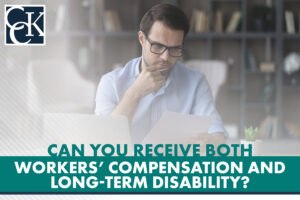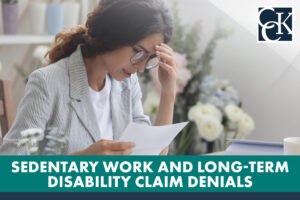Long-Term Disability Lawyer Serving Montville, NJ
When you develop a medical condition that prevents you from working, you must consider filing for long-term disability (LTD) benefits. It is often difficult to file for such benefits when you must also manage your condition. There is also the stress of dealing with your insurance company to receive your benefits.
Whether you are filing an initial claim or appealing a denial of benefits, a long-term disability lawyer serving Montville, NJ from Chisholm Chisholm & Kilpatrick may be able to assist you. Call us today at (800) 544-9144 for a free case evaluation with a member of our team.
Contacting a Long-Term Disability Lawyer is Beneficial for Your Claim
Many claimants decide to handle their LTD claim on their own, but there are benefits to consulting with a long-term disability lawyer. The process is often complex. When you handle a claim on your own you are more likely to make a mistake. These mistakes may be minor, but they can cost you your benefits. A long-term disability insurance attorney can help you avoid these mistakes.
Long-term disability policies are sometimes hard to understand. They often contain several limitations and exclusions among other vital information. Your policy also includes a definition of disability, which is essential to understand. To receive LTD benefits, you must prove you meet this definition. A member of our team can thoroughly review your policy and determine the best evidence to gather to prove your claim.
Additionally, if you receive your policy through your employer, you must be aware of ERISA. In short, ERISA governs group policies and has its own strict deadlines and regulations. For example, you may not submit new evidence after the appeal stage.
An ERISA attorney can help guide you through the obstacles this federal law presents. Our team tracks all ERISA deadlines to ensure your insurer receives everything on time.
Our Team Will Gather the Best Evidence to Support Your Claim or Appeal
Medical records are often your primary source of evidence; however, these records should not be your only source of evidence. Rather, you should submit supplemental evidence as part of your claim or appeal. CCK can gather this evidence for you. Our team utilizes various forms of supplemental evidence to support your claim, such as:
- Specialized reports from treating physicians: Obtaining a specialized report from your treating physicians can highlight certain aspects of your condition that your medical records do not. Maintaining an open dialogue with your doctor helps them accurately describe your condition in these reports.
- Witness statements from family, friends, and coworkers: Often, the people who see you each day can provide objective evidence of your condition. Your family and friends can attest to how your condition affects you at home, and your coworkers can vouch for how your condition prevents you from working.
- Opinions from outside experts: Outside experts can provide objective evidence that evaluates your condition. For example, an outside expert may conduct a functional capacity or neurophysiological assessment. Moreover, a vocational expert can perform an evaluation that shows how your condition affects you at your specific job.
CCK Can Alleviate the Stress of Dealing with the Insurance Company
The disability rate between 2016 and 2020 in Montville, NJ was 3.5 percent for those 65 years of age and younger. Long-term disability benefits help protect your income when you cannot work due to a medical condition or injury. However, when you file for these benefits, you must deal with your insurance company.
Insurance companies are difficult to work with, and they often prioritize their financial needs over the health needs of their clients. As such, insurers deny many claims. They also request a lot of information throughout the process. CCK can alleviate the stress of dealing with the insurance company by first acting as a point of contact. When we act as a point of contact, the insurance company must correspond with us. This ensures you do not have to deal directly with them at any point.
Additionally, we will track all deadlines and submit all evidence that your insurer requires. Further, if your initial claim receives a denial, you have the right to appeal. Our long-term disability team can evaluate your denial letter, address any issues with your claim, gather updated evidence, and submit a comprehensive appeal package to your insurance company.
Contact Chisholm Chisholm & Kilpatrick Today for a Free Case Evaluation
Regardless of where in the process you are, a long-term disability lawyer serving Montville, NJ from Chisholm Chisholm & Kilpatrick may be able to help. Our team understands the frustration that comes with filing or appealing for benefits. We believe you should not have to worry about this and instead should focus on your health.
Call us today at (800) 544-9144 for a free case evaluation. Our team will see if we can help.
Montville Blog Posts
-
 Long-Term Disability (LTD) Claims for Accountants
Long-Term Disability (LTD) Claims for AccountantsThere are, in the United States, approximately 1.32 million accountants. These hardworking professionals are a vital part of many major businesses, as they are responsible for the financial data of a given company or individual. As such, the cognitive abilities of an accountant are a priority for them to maintain. A medical condition that affects […]
-
 Can You Receive Both Workers’ Compensation and Long-Term Disability?
Can You Receive Both Workers’ Compensation and Long-Term Disability?Workers’ compensation and long-term disability (LTD) each can play a vital role in providing financial stability when you suffer an injury or illness. Workers’ compensation provides benefits for recovery from work-related injuries or illnesses, potentially including partially lost wages, medical expenses, retraining, and more. LTD provides significant wage replacement if you are unable to work […]
-
 Sedentary Work and Long-Term Disability Claim Denials
Sedentary Work and Long-Term Disability Claim DenialsLong-term disability (LTD) claims involving sedentary work can be especially challenging for claimants. Insurers may deny a claim on the basis that the decreased physical demands of the job mean medical conditions are less likely to interfere with a claimant’s ability to work. Yet this is usually not a fair assessment of these claims. In […]